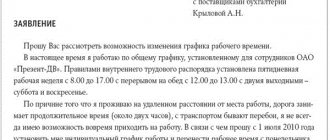An apprenticeship agreement with an employee of an enterprise, a sample of which is offered as a template for drawing up, is one of the documents regulating labor relations, that is, the relationship between an employer and an employee in a situation where the latter needs to undergo training (internship, retraining) at the enterprise.
Article 198. Student agreement
An employer - a legal entity (organization) has the right to conclude with a job seeker an apprenticeship contract for vocational training, and with an employee of this organization - an apprenticeship agreement for vocational training or retraining on-the-job or off-the-job.
(as amended by Federal Law No. 90-FZ of June 30, 2006)
A student contract with an employee of this organization is additional to the employment contract.
(as amended by Federal Law No. 90-FZ of June 30, 2006)
Is an entry made in the work book during the apprenticeship contract?
The grounds for concluding this type of agreement are regulated by law and specified in the Labor Code of the Russian Federation. The main advantage of concluding a fixed-term contract is the absence of a complex and lengthy procedure for registering an employee and there is no need to pay compensation other than vacation pay upon his dismissal.
But an incorrectly executed temporary contract may be recognized as indefinite, and the employee will be required to be hired on a general basis. When drawing up a fixed-term contract, entries in the work book are made without fail.
Moreover, the nature of the work (temporary) is not indicated. The entry is made in a standard way, indicating the organization, position and the basis document. Info However, this does not prevent the employer from carrying out professional training of the employee
Student agreement.
how to correctly make an entry in the work book about the conclusion of an employment contract between the employer and the student
In personnel practice, there are many cases when employers hire individuals to perform functional duties in the professions of “security guard apprentice”, “driver apprentice”, etc.
Undoubtedly, this is done so that during the period of the so-called apprenticeship the employee is paid much less
Nuances of drawing up a work contract: is an entry made in the work book for a fixed-term employment contract?
» » » » » If we are not talking about part-time workers, then a mandatory consequence of concluding a fixed-term employment contract with a new employee is an entry in the work book about this, indicating specific dates. Let's look at what the rules are in this regard. Any labor relations between employees and employers must be recorded.
Their presence is generally confirmed by the contract, as well as an entry in the employment contract - in case of a fixed-term employment contract or an open-ended one. If the execution of this document accompanies the establishment of a specific period during which the employee must perform his labor functions, then such a contract is considered urgent.
An employee was accepted under a student agreement; how to make an entry in a work book
But, we believe, in such a situation, the teaching of special knowledge or special training will be carried out by the employer himself or not, but in a licensed educational unit, with the subsequent issuance of relevant and properly executed documents to the employee confirming that he has received special knowledge or undergone special training.
During the period of training for a new profession in the educational division of a licensed organization, an employee already working in it, for the purpose of further transfer to another job in the same organization that requires confirmed special knowledge, must be listed as performing work in the profession in which he works before the transfer. In accordance with Art.
Question: .1.
(“Economic and Legal Bulletin”, 2003, n 1)
“Economic and Legal Bulletin”, No. 1, 2003 Question: According to the Labor Code of the Russian Federation, an apprenticeship contract with a job seeker is civil and regulated by civil legislation (Article 198 of the Code).
At the same time, according to Article 205 of the Labor Code of the Russian Federation, labor legislation applies to students. Article 207 of the Labor Code of the Russian Federation provides for the conclusion of an employment contract with a student upon completion of the apprenticeship. At the enterprise, training of students in basic professions takes place at workplaces in the main production workshops with hazardous working conditions.
In this regard, we ask you to clarify the following questions: 1) is an employment contract concluded at the same time as the apprenticeship contract?
If yes, what content? 2) whether an entry is made in the work book about hiring a student; 3) whether an order is issued for the enterprise on acceptance by an apprentice or on the conclusion of an apprenticeship agreement; 4) is the apprenticeship period counted towards the total length of service, preferential length of service, and is it paid?
Is it necessary to make an entry in the work book about the apprenticeship contract (Chapter 32 of the Labor Code)
141 lawyers are now on the site 3131 consultations in 24 hours If you have difficulty formulating a question, call the toll-free multi-channel phone, a lawyer will help you 14:06 14:05 13:58 13:51 13:37 14:09 14:08 14:07 14: 07 14:06 Show more Russia, Rybinsk 07/18/2002 at 11:34 question number No. 45894 read 1826 times On the one hand, this is a civil law contract, and on the other, the student is subject to labor legislation. Urgent legal consultation free of charge Lawyer Russia,
Source: https://zpp-moscow.ru/delaetsja-li-zapis-v-trudovuju-knizhku-pri-uchenicheskom-dogovore-90478/
Article 199. Contents of the student agreement
The student agreement must contain: names of the parties; an indication of a specific profession, specialty, qualification acquired by the student; the employer’s obligation to provide the employee with the opportunity to study in accordance with the apprenticeship contract; the employee’s obligation to undergo training and, in accordance with the acquired profession, specialty, qualification, to work under an employment contract with the employer for the period established in the apprenticeship contract; duration of apprenticeship; amount of payment during the apprenticeship period.
The student agreement may contain other conditions determined by agreement of the parties.
Apprenticeship contract: employer's protective conditions
The practice is becoming increasingly widespread when employees undergo training at the expense of the employer. In highly competitive conditions, there is a risk that an employee will leave the employer company through which he received training and will use the acquired knowledge in the interests of competitors. Baida Anna Georgievna, LL.M., senior lawyer, head of the labor law department of an international law firm, told TS what conditions an employer needs to include in a student agreement in order to protect its interests.
The law distinguishes two types of student agreement. What is this connected with? When should each be used?
Indeed, the law provides for two types of student agreements, and each of them has its own subject of regulation.
First of all, we should highlight an apprenticeship labor contract, which is concluded with a person hired by a specific employer and undergoing vocational training or retraining on-the-job or off-the-job.
There is also a student agreement of a civil law nature. It is concluded with a person who is not yet working in the company, with the so-called “job seeker”, but for the purpose of his further work in such a company.
In this regard, it is necessary to draw the attention of employers to the letter of the Federal Social Insurance Fund of the Russian Federation dated June 11, 2003 No. 02-18/05-3937, which, in particular, states that “an apprenticeship agreement with a job seeker is civil and regulated by the rules civil legislation, and an apprenticeship contract for on-the-job retraining is additional to the employment contract and is regulated by labor legislation.”
Let's focus on the student agreement with the employee. What requirements does the law impose on such an agreement?
According to Part 1 of Art. 196 of the Labor Code of the Russian Federation, the employer independently determines the need for professional training or retraining of personnel for its own needs and decides in what form it will take place (individual, team, coursework, etc.), in what specialties. When drawing up an apprenticeship agreement, the employer should keep in mind that, in principle, no single (standard) apprenticeship agreement can exist. The main thing is that the agreement for training and retraining be concluded in writing. By virtue of Art. 199 of the Labor Code of the Russian Federation, such an agreement must necessarily contain such provisions as: names of the parties; an indication of a specific profession, specialty, qualification acquired by the student; duration of apprenticeship; amount of payment during the apprenticeship period; the employee’s obligation to undergo training and, in accordance with the acquired profession, specialty, qualification, to work under an employment contract with the employer for the period established in the apprenticeship contract; the employer’s obligation to provide the employee with the opportunity to study in accordance with the apprenticeship contract, as well as other provisions necessary, in the opinion of the parties. But let me remind you that the terms of the student agreement that contradict the Labor Code of the Russian Federation, the collective agreement, and agreements are invalid and are not applied.
In what capacity does the educational institution appear in the student agreement?
The parties to the contract are the employer and the employee. Also, an educational institution in which the employee will be trained can act as a third party to the contract.
Does training time count towards annual leave?
Yes, since by virtue of Article 121 of the Labor Code of the Russian Federation, the length of service giving the right to leave includes the time when the employee did not actually work, but he retained his place of work.
How long can a student contract be valid for?
Let me remind you that according to the apprenticeship contract, the employee is obliged to undergo training in a certain profession and specialty, and obtain a certain qualification. Therefore, the contract is concluded for the period necessary to train a given profession, specialty, qualification. And it is valid from the day specified in it, for the period specified by it.
In what cases can the term of a student agreement be extended?
The validity of the student agreement is extended for the duration of the student’s illness, military training, and in other cases provided for by federal laws and other regulatory legal acts of the Russian Federation. The employer has the right to establish a complete list of reasons why the validity of the apprenticeship contract can be extended in the relevant local regulatory act, for example, in the Regulations on the apprenticeship contract, etc.
Can changes be made to the terms of the student agreement? How should they be formatted?
During the validity period of the student agreement, its content can be changed only by agreement of the parties. Changes must be formalized as additions to the student agreement, signed by its parties. In this case, each of them must be given its own copy.
The procedure for paying tuition fees usually causes heated debate. Is the employer obliged to cover it if he is the initiator of the training?
The cost of employee training is agreed upon by the parties. Payment may be made entirely at the expense of the employer, or may vary depending on the success of the employee’s training. Thus, some employers adhere to the following practice: for example, if an employee passes all intermediate exams with a grade of 5, then the employer pays 100% of the cost of training, if there are also grades of 4, then the employer pays only 80% of the costs.
How to determine the amount of stipend paid to an employee during the training period?
Indeed, during the apprenticeship period, students are paid a stipend at the expense of the employer. Its maximum size is not limited. The amount of payment is determined in the student agreement with a specific student and depends on the profession, specialty, and qualification he receives. However, there is a limitation regarding the minimum amount of the scholarship. So, according to Part 1 of Art. 204 of the Labor Code of the Russian Federation, it cannot be lower than the minimum wage.
If an employee is involved in work during the training period, how is he paid?
The answer is given by Part 2 of Art. 204 Labor Code of the Russian Federation. It says that the work done by the student during practical classes is paid according to the current rates in the organization. That is, payment cannot be lower than the amount determined according to established rates. Although, if the parties to the student agreement stipulate a different payment procedure, but in a larger amount, then you should adhere to it.
Within what time limits can a student be involved in work?
When concluding a student agreement, the provisions of Art. 91 and part 1 of Art. 203 of the Labor Code of the Russian Federation, according to which the total time of training and work during the week cannot exceed a certain standard of working time - 0 hours.
By virtue of Art. 92 of the Labor Code of the Russian Federation, it is necessary to establish a shortened working or school week for minors, disabled people of group I or II, and workers employed in work with harmful or dangerous working conditions. It should also be remembered that during the period of validity of the apprenticeship contract, apprentices, as employees of the organization, cannot be involved in overtime work and sent on business trips not related to the apprenticeship. Such a ban is established in Part 3 of Art. 203 Labor Code of the Russian Federation.
And if an employee is sent to another location for training, will this be considered a business trip? And what is the payment procedure in this case?
First, let me remind you that if an employer sends an employee for advanced training outside of work, he must retain his place of work (position) and the average salary at his main place of work. If an employee is sent to improve his qualifications with a break from work in another area, in accordance with Art. 187 of the Labor Code of the Russian Federation, he is paid for travel expenses in the manner and amount that are provided for persons sent on business trips.
What are the consequences of early termination of a student agreement?
Today, the employer has the opportunity to stipulate in the apprenticeship contract the employee’s obligation to work for him for a certain period established in the apprenticeship agreement. It may also provide for “other conditions by agreement of the parties,” in particular, the possibility for the employer to receive compensation for his costs for the employee (for his training) if for some reason the employment relationship between them terminates earlier than the period originally established in the employment contract .
The consequences of early termination of a student contract directly depend on the grounds on which it was terminated. Therefore, it is advisable for the employer to clearly state the grounds for early termination. For example: termination of employment on grounds established by law, or improper performance by an employee of training obligations, expressed in absenteeism or receiving negative grades; changes in the company’s interests in the appropriate training (retraining) of the employee; expulsion of an employee from an educational institution for reasons not related to the educational process, primarily for violation of discipline; employee’s refusal to train for any subjective reasons, etc.
When can an employee be released from contractual obligations?
The grounds for releasing an employee from liability under a contract in the form of payment of compensation and damages are usually related to the valid reasons why he refused to fulfill his obligations. For example, these usually include illness, disability, pregnancy and some other objective circumstances.
Does the termination of an employment contract also entail the termination of a student contract?
A student agreement with an employee is accessory to the employment contract and is often drawn up as an additional agreement to it. However, a student agreement, based on the meaning of the norms of the Labor Code, is an independent transaction. In this regard, termination of an employment contract with an employee does not entail automatic termination of the student contract, unless this is directly provided for by agreement of the parties. This thesis is confirmed by judicial practice.
As a result, it is advisable to provide in the apprenticeship contract for the employer to unilaterally refuse to fulfill obligations under it, as well as its termination in connection with the dismissal of the employee.
How does an apprenticeship agreement concluded with job seekers differ in terms of content from the one concluded with an employee?
An apprenticeship agreement with a job seeker (that is, not in an employment relationship with the counterparty under the agreement), in its content, largely corresponds to the listed features of the considered type of apprenticeship agreement. Its main feature is that there are no labor relations between the parties at the time of its conclusion. If we talk about specific differences in the content of this type of agreement, then, as a rule, they are as follows. Firstly, the terms “employee” and “employer” are not used in the names of the parties. This is understandable - after all, there are none of them. Participants are designated in most cases as “.
The second difference is that the student is obligated to find a job in the company after completing the training. Moreover, sometimes the contract specifies his position and the minimum salary. And finally, such an agreement is subject to general civil statutes of limitations, which are much longer than the periods provided for by labor legislation.
Are the norms of the Labor Code of the Russian Federation, in particular Chapter 32, applicable to a student agreement concluded with a job seeker? Or is this transaction (as not provided for by law, but also not contrary to it) exclusively subject to the provisions of the Civil Code of the Russian Federation?
I must admit that this question is quite acute, since the answer to it can significantly affect the rights and obligations of the parties to such an agreement in the event of a dispute in court. However, in science and in practice, it must be admitted that it is resolved ambiguously.
Nevertheless, the civil law nature of the contract provides greater freedom for the parties to determine mutual rights and obligations, and this must be taken advantage of.
Please explain, using the example of a student’s obligations, how this can be done.
For example, the apprenticeship contract can separately stipulate the consequences of terminating the employment relationship before the end of the period during which the student is obliged to work in the company. These may include, for example: payment of compensation for the costs of training a student, compensation for damage, payment of compensation, etc. In this regard, the parties should comprehensively determine the types of valid reasons for which an employee is exempt from liability for refusal to fulfill an obligation, otherwise the resolution of this issue remains within the competence of the court considering the dispute. Thus, sometimes it is advisable to indicate that in cases of failure to fulfill obligations under the contract, the entire amount of costs incurred is recovered from the employee in favor of the employer in full (and not in proportion to the time worked by the employee), while it would not be out of place to provide for the deadline for the employee to pay compensation for the company’s expenses and establish a penalty for failure to comply with this deadline.
In what cases does an organization have the right to refuse to fulfill a student agreement?
It should be noted that recently there has been an increase in appeals to the courts by citizens with demands to companies for the forced fulfillment of their obligations under the apprenticeship agreement (for example, payment for training, subsequent employment) or for compensation for losses caused by the company’s improper fulfillment of the apprenticeship agreement.
In this regard, companies are invited to provide in the apprenticeship agreement the right to unilaterally refuse to fulfill an obligation with prior notification of the citizen about this within a reasonable time, which is fully consistent with the general provisions of the Civil Code of the Russian Federation on obligations.
Thus, in order to most effectively realize the interests of the company in the field of apprenticeship legal relations, the apprenticeship agreement itself must regulate in detail the order in which all controversial issues arising between its parties should be resolved.
BIOGRAPHY
In 1997 she graduated from the Faculty of Law of Moscow State University. M.V. Lomonosov, then received a Master of Law (LL.M.) degree from Leiden State University (Netherlands). Subsequently, Anna began working as a legal consultant in the Moscow office (Switzerland).
In the period from 2006 to 2008. occupied the position of lawyer in the Moscow office of Legal (USA).
From 2008 to 2009 worked as a lawyer in the representative office (Sweden) in Moscow.
Since 2009, he has been working in the Moscow representative office of Legal.
Personal questions
Which historical period is closest to your spirit?
I think the Italian Renaissance, when people worshiped reason and its creative power.
How long have you visited the theater? Which? What show did you go to?
Yes, I love the theater. There are several favorites, it’s difficult to choose just one... The last time I was at the Moscow Art Theater was Chekhov’s “Old World Landowners,” Gogol and his reading are touching.
What's your favorite time of year? Why?
Spring, it’s amazing to see how everything wakes up, changes and gains its power and beauty...
What cuisine do you prefer?
I love delicious dishes, but I especially like it if they are Italian.
CONCEPTS
Profession is a type of work activity, occupation of a person who possesses a complex of special knowledge, skills and abilities acquired through education and training.
Specialty is a type of professional work activity, narrower than a profession, improved through special training; a certain area of work, knowledge.
Qualification is the level of preparedness, skill, degree of suitability for performing work in a certain specialty or position, determined by rank, class, rank and other qualification categories.
Article 201. Validity of the student agreement
The student agreement is valid from the date specified in this agreement for the period stipulated by it.
The validity of the student agreement is extended for the duration of the student’s illness, military training, and in other cases provided for by federal laws and other regulatory legal acts of the Russian Federation.
(as amended by Federal Law No. 90-FZ of June 30, 2006)
During the validity period of the student agreement, its content can be changed only by agreement of the parties.
Article 203. Time of apprenticeship
The apprenticeship time during the week should not exceed the standard working time established for workers of the appropriate age, profession, specialty when performing the relevant work.
Employees undergoing training in the organization, by agreement with the employer, can be completely released from work under an employment contract or perform this work on a part-time basis.
During the period of validity of the apprenticeship contract, employees cannot be involved in overtime work or sent on business trips not related to the apprenticeship.
Article 207. Rights and obligations of apprentices upon completion of apprenticeship
For persons who have successfully completed an apprenticeship, when concluding an employment contract with the employer under whose contract they were trained, a probationary period is not established.
If the apprentice, at the end of the apprenticeship, without good reason, does not fulfill his obligations under the contract, including not starting work, he, at the request of the employer, returns the scholarship received during the apprenticeship, and also reimburses other expenses incurred by the employer in connection with the apprenticeship.
Apprenticeship duration
Depending on the duration of the course, the validity period of the student agreement is determined. The apprenticeship period may be extended if this is due to the trainee’s prolonged illness, military training, and in other cases provided for by the legislation of the Russian Federation.
It is also worth specifying the conditions for early termination of the contract. This may be a dishonest attitude towards training - absenteeism without a good reason, unsatisfactory results of certifications, or there may be medical contraindications to the performance of certain job functions.
If a student, on his own initiative, interrupts his studies or does not begin work upon completion, the organization has the right to demand the return of funds transferred to the educational institution and paid in the form of a scholarship.








